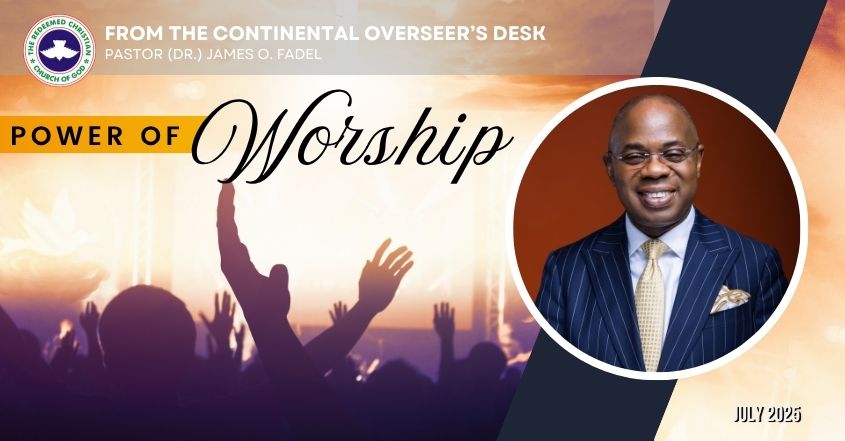“They all realized they were in a place of holy mystery, that God was at work among them. They were quietly worshipful—and then noisily grateful, calling out among themselves, “God is back, looking to the needs of his people!” The news of Jesus spread all through the country.” Luke 7:16-17, MSG
I welcome you to the 7th month, the month of perfection. A month where, “The LORD will perfect that which concerns me” (Psalm 138:8). All the miracles, signs and wonders we received in June 2025 shall be perfected this month through praise and worship. In John 17:17, ten lepers were healed. Only one Samaritan came back and worshipped, and he was made whole (Luke 17:19). The widow of Nain’s son was carried on a stretcher to be buried (Luke 7:12). After the son was brought back to life by the God of Signs and wonders, the whole city came and worshipped the LORD. The crowd was filled with awe. Eugene Peterson sums up the story in Luke 7:16, MSG, saying, “They all realized they were in a place of holy mystery, that God was at work among them. They were quietly worshipful—and then noisily grateful, calling out among themselves, “God is back, looking to the needs of his people!” The news of Jesus spread all through the country.” The crowd worshipped God.
Worship is central to the relationship between God and His people because it expresses dependence on, love, reverence, and honor for Him as Creator, Redeemer, and LORD. In Luke 17:16, the healed Samaritan leper returned to worship and give thanks, illustrating how worship springs from a grateful heart and acknowledges the source of mercy.
Therefore, worship is a declaration of our weakness and God’s strength.
- When we worship, the invisible God is at work doing invisible and powerful things
- “When things are wonderful, we praise Him. When things are horrible, we praise Him. Whether we are happy or sad or terrified or bored, we are determined to offer to God our sacrifice of praise. Everything in us should give praise to the Lord.“ John Dickson
WHAT IS WORSHIP?
Worship is derived from the Old English word for worthiness or meritoriousness and thus giving God the recognition He deserves. The Greek word, “proskyneo,” and the Hebrew word, “shachac,” both refer to a posture of submission and thus an acknowledgment of God’s sovereignty.
- Matthew 4:8-9 (NLT) speaks of kneeling down to worship. It literally means kneeling or prostration to do homage (to one) or make obeisance whether to express respect or to make supplication.
- Obeisance requires an attitude of reverential fear. This is evident in the behaviors of bending the knee (i.e. Gonu or Gonupeteo) and bowing down (Histahawa or Shachach {Heb.} or Proskyneo (Gk. to kiss forward) which are associated with worship.
The terms that communicate attitudes of service, submission & reverence (i.e. which are translated ‘worship’) do not indicate how such attitudes ought to be shown. However, when we examine the behavior of worshippers, we notice something wonderful!
Why Is Worship So Important to God?
- God is worthy by nature – Worship affirms God’s supreme worth (Psalm 96:8). Revelation 4:11: “You are worthy, our Lord and God, to receive glory and honor and power…”
- It aligns our hearts with His will – Worship focuses us on God’s holiness, not just our needs. John 4:23-24: “…the true worshipers will worship the Father in spirit and truth…”
- Worship builds relationship – It is intimacy with God, not mere ritual. Psalm 22:3: “But You are holy, enthroned in the praises of Israel.”
- It changes us – We become like what we behold (2 Corinthians 3:18). Worship transforms our values, desires, and vision.
Worship is the fountainhead of all power!
- The power of worship. Worship creates a place for God’s rule to be reinstated, re-establishing His rulership through His redeemed.
- What man lost in the Garden of Eden, Jesus restored through His death and resurrection. Where the people of God worship, divine power flows to penetrate the darkness and counterattacks the operations of hell.
- Where God’s presence is, there will be power. Where worship is released, God’s presence will abide. Then, God’s power and rule will be established in and through us to flow to others.
- The Church was commissioned in a worship service.
- Matthew 28:16-20. After the disciples worshiped the resurrected Lord in that Galilean encounter, Jesus told them, all power is given unto Me, and I am commissioning you to go in My name with that power.
- They would receive the anointing of that power shortly, but the commission to go with that power was being given now.
- The Church was born in a worship service.
- At Pentecost, it was the worship of the Lord (not the proclamation of the gospel) that ushered in the power of God’s Kingdom and confounded the people (Acts 2:1-13).
- The worship of the Lord releases the power, the pathway and the purpose of what He wants to do in His Church.
- The most notable episode is in the outflow that took place at a worship meeting at Antioch (Acts 13:2,48). It determined the flow of history and the course of Western civilization.
- There is worship in Heaven: Revelation 4:1-11. “Thy kingdom come, Thy will be done in earth, as it is in heaven”(Matthew 6:10).
- Three things we do in church: 1. Praise, 2. Preach, 3. Pray. In heaven, only praise is necessary.
Examples of Worship in the Old Testament
- Abraham (Genesis 22:5) – Called his obedience to sacrifice Isaac worship. True worship often involves trust and surrender.
- Moses and Israel (Exodus 15:1–21) – After crossing the Red Sea, they worshiped in song. Worship can be a response to God’s mighty acts.
- David (2 Samuel 6:14; Psalm 63) – Danced before the Lord with all his might. Worship is passionate and personal.
- Solomon (1 Kings 8:22–61) – Dedicating the temple with prayer and praise. Corporate worship honors God’s dwelling presence.
- Job (Job 1:20–21) – Worshiped even in grief: “The Lord gave, and the Lord has taken away…”
Examples of Worship in the New Testament
- Wise Men (Matthew 2:11) – They worshiped the infant Jesus with gifts and reverence.
- Jesus in Gethsemane (Matthew 26:39) – His submission to the Father’s will is worship in surrender.
- Mary of Bethany (John 12:3) – Anointed Jesus’ feet with costly perfume—a worship of love and sacrifice.
- The Early Church (Acts 2:42–47) – Worshiped in fellowship, teaching, breaking of bread, and praise.
- Paul and Silas (Acts 16:25) – Sang hymns in prison—worship in suffering and faith.
Conclusion:
Worship is the heart’s response to who God is and what He has done. It’s not confined to music or words, it is a lifestyle of honor, obedience, and adoration. Whether in joy, sorrow, or awe, worship draws us closer to God and reflects His glory back to Him.
- Your deliverance is in your YADAH – extend your hands and worship God, this is a sign of surrender.
- Your healing is in your TOWDAH – an extension of the hand in adoration, or acceptance.
- Your breakthrough is in your SHABACH a shout, to address in a loud tone, to command, to triumph.”
- Your stuff is in your HALAL – to be clear, to shine, to boast, show, to rave, celebrate, to be clamorously foolish, sing in a loud voice.”
- Your joy unspeakable and full of glory is in your BARAK – I’m not talking about the President, but to kneel down, to bless God as an act of adoration.”
Everything that you need is in your worship, so you need to proskyneo and worship the true and living God. It’s in your worship.
Prayers:
- Father, you are a God of new beginnings, you gave Elisha, Joseph, Paul each a new beginning. Please give me a new beginning in my life, family, and church so we can worship you, in Jesus’ name.
- Father, from now on, let me sing and worship you with a new song of victory, triumph, and deliverance, and give me total freedom physically, materially, and maritally, in Jesus’ name.
- Song: I live for Jesus’ day after day, I live for Jesus let come what may. The Holy Spirit I will obey; I live for Jesus’ day after day. Declaration: I receive the power to live holy, walk holy, and talk holy, in Jesus’ name.


